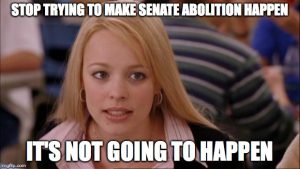Senator Mike Duffy is back in the news again, once again claiming his housing allowance for his long-time residence in Ottawa, because of course he is. There are a couple of problems here, but the first one is the way in which the story is being reported.
“Hasn’t the Senate tightened its rules?” is usually the first plaintive wail that we hear, and yes, they did. They have put rules in place around what constitutes proof of a primary residence in the province that a senator represents, and those rules include things like driver’s licence, health card, CRA tax assessment – things that Duffy didn’t have when he was first appointed and yet started claiming his housing allowance for the residence he lived in for years already. Duffy has since acquired the necessary documentation to “prove” that his primary residence is PEI. It’s also problematic to start devising a formula for how many hours one has to spend in their primary and secondary residence because it is generally a qualitative and not a quantitative measure, complicated by the work that senators do, and in some cases, there are senators who can’t travel back to their primary residences because of health concerns and are essentially forced to spend more time in Ottawa than they would otherwise. They may yet assign some kind of hour or day measure, but my understanding is that there is not one at the moment.
The bigger problem here is not the rules or the Senate itself (and for the love of all the gods on Olympus, I wish that my journalistic colleagues would stop treating this issue as a problem of the institution than its actors), but rather that Duffy himself is completely and utterly without shame. If he had any shame or decency, he wouldn’t keep claiming for his Ottawa residence, because he would know that it’s what got the whole issue rolling in the first place. But no – he is entitled to his entitlements, and has taken the fact that he was not convicted of criminal fraud and breach of trust as validation rather than the fact that he was nevertheless condemned for his behaviour while recognizing that it didn’t quite meet the test of being criminal. And that’s why this is really a Mike Duffy problem and not a Senate problem. He never should have been appointed as a PEI senator, and yet here we are.

